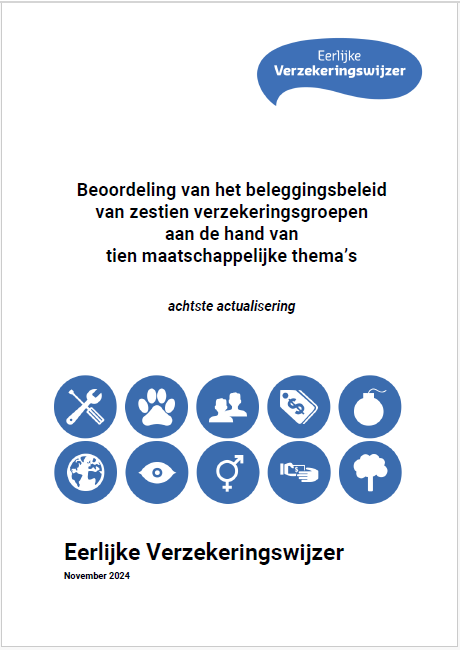Insurers' investment policy far from 'responsible'
Insurers are improving their socially responsible investment policies, but there is still a long way to go.
A new study by the Dutch Fair Insurance Guide has found that the majority of the sixteen largest insurers in the Netherlands have tightened their policies, with ONVZ leading the way, followed by Univé. The study assesses the investment policies of the insurers on the basis of ten social themes, such as human rights, weapons and climate change.

Which insurer tightened up its sustainability policy and which did not or only minimally?
Compared to the assessment of 2022, insurers are, on average, doing better. In the areas of animal welfare and nature in particular, policy has improved significantly, while progress has also been made in the areas of gender equality and weapons. Despite these improvements however, altogether the sixteen insurance groups just about achieve a pass mark for their policies, with an average of 5.7.
- In addition to ONVZ and Univé, Zorg en Zekerheid, DSW, Unigarant (ANWB), CZ, NN Group and Achmea sharply tightened their policies.
- De Goudse, ZLM, VGZ, Menzis, ASR, Klaverblad, Allianz and Athora did not do so, or only minimally.
Room for improvement
'There is still a lot of room for improvement', says Titus Bolten on behalf of the Fair Insurance Guide. 'In the area of transparency and accountability, for example, where only six insurance groups have a complaints mechanism that is open to people who may be victims of human rights violations in which the insurer is involved through its investment activities. Or in the field of animal welfare, where we see that only seven insurers consider non-medical animal testing a no-go. Most insurers' weapons policy now stipulates that deliveries to controversial regimes are unacceptable, but a quarter of insurers still do not have a policy on this.'
Since 2013 there have been 9 policy assessments: How do the insurance companies rank after this time?
- Achmea, ASR and VGZ achieve an average score of 8 ('good')
- CZ, Univé and NN Group a 7 ('more than sufficient')
- ONVZ, Zorg en Zekerheid and Unigarant (ANWB) a 6 ('sufficient')
- Menzis, Klaverblad, De Goudse a 5 ('doubtful')
- DSW, ZLM: 4 ('unsatisfactory')
- Allianz: 3 ('far from satisfactory')
- Athora, whose policy has been assessed at group level for the first time in this study, scores 'very poor' across the board: 1.
Consumers expect more from their banks and insurers
The Fair Insurance Guide points out that consumers expect more and more from their bank or insurer. Most Dutch people indicate that they see financing policy as the key to banks and insurers having a positive impact in the world. 'Insurers that do not have their policies in order are not well equipped to make the necessary sustainable and socially responsible investment choices in practice. We encourage all insurers to take extra steps', says Bolten
The policy research was carried out by Profundo.
